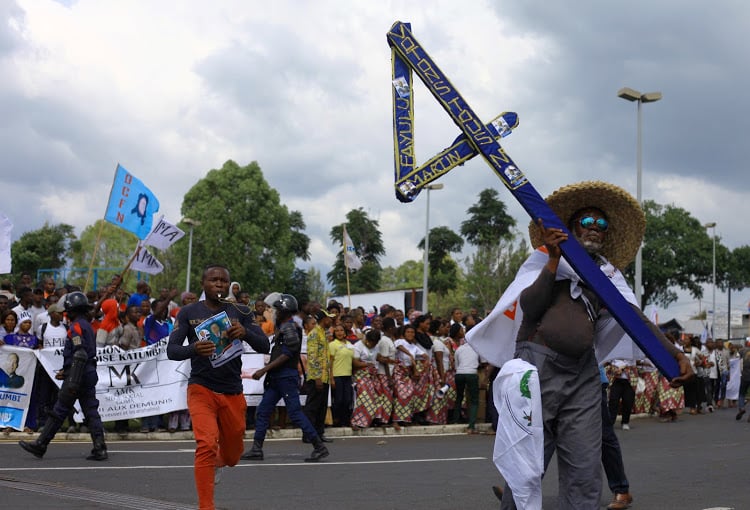Congo elections: Calm before the storm?

Agency
December 11, 2018

KINSHASA– The election posters are up, the candidates are doing the rounds and the party rallies are taking place almost without a hitch.
But observers say plenty of nasty surprises remain in store as the Democratic Republic of Congo, Africa's powder keg, barrels towards presidential and parliamentary elections on December 23.
Beneath a relatively smooth campaign lie uncertainties that could lead to lasting political turmoil or violence, they warn.
"The organising (of the elections) has not been transparent or credible and the people aren't free" to choose, Nobel Peace laureate Denis Mukwege told AFP before he headed to Oslo for Monday's award ceremony.
"So it's certain that the results will lead more likely to protests and this is not good for democracy," said the surgeon, who has treated thousands of women raped by armed fighters.
- Symbol -
For decades, the DRC has been an emblem of Africa's promise and tragedy. Nearly four times the size of France, the country sits atop glittering treasures, ranging from gold and uranium to copper and cobalt.
But this wealth has benefited only a few, at the top of a country where corruption and inequality are rife.
Violence, meanwhile, is a political hallmark. The DRC -- formerly known as Zaire -- has never known a peaceful transition of power since it gained independence in 1960 from Belgium, which brutally carved out its borders in the 19th century.
In the past 22 years, two massive wars have shaken the country, claiming millions of lives and sucking in armies from around southern and central Africa.
Lower-level conflicts are burning in the centre and east of the country and these could easily flare into full-fledged wars, say analysts.
Twenty-one people are vying to succeed President Joseph Kabila, who in spite of his relative youth -- he is 47 -- has run the sprawling, mineral-rich central African state since 2001, taking over from his assassinated father, Laurent.
But the lineup of candidates is thick with controversy, not least Kabila's hand-picked successor Emmanuel Ramazani Shadary, who will contest the poll under EU sanctions.
On Monday, the bloc voted to extend a travel ban and asset freeze slapped on him over his role as interior minister in a bloody crackdown on opposition activists.
Opposition ranks, meanwhile, have been weakened by a decision by DRC's National Election Commission to bar two heavyweights -- former warlord Jean-Pierre Bemba and regional baron Moise Katumbi, who are powerfully supported in the west and southeast of the country, respectively.
The move leaves two opposition frontrunners: Felix Tshisekedi of the UDPS party and Martin Fayulu, who has won Bemba's and Katumbi's backing.
- Voting machines -
Adding to accusations of political meddling are the questions hanging over the election's organisational credibility.
They range from South Korean-made electronic voting machines to a lack of foreign election observers, the Congo Research Group at New York University said on November 27.
The opposition is divided over the voting devices, with some denouncing them as "cheating machines," but others acquiescing in their use. The authorities have invited monitors from the African Union, but not from the European Union and the Carter Foundation, who would provide global scrutiny of the poll.
On December 23, "more than seven million votes could be potentially fraudulent," the French-language report said.
"If the elections take place in these conditions, they could cause the country to face years of protests, further weakening election legitimacy and aggravating the conflicts in the east and in Kasai."
The central, diamond-rich Kasai region spiralled into violence in 2016 after a powerful local chieftain was killed by security forces. Around 3,000 have died and 1.4 million more displaced by fighting.
Election preparations are also being tested in eastern DR Congo, where the authorities are battling militia groups and a deadly outbreak of Ebola.
---


Leave Comment